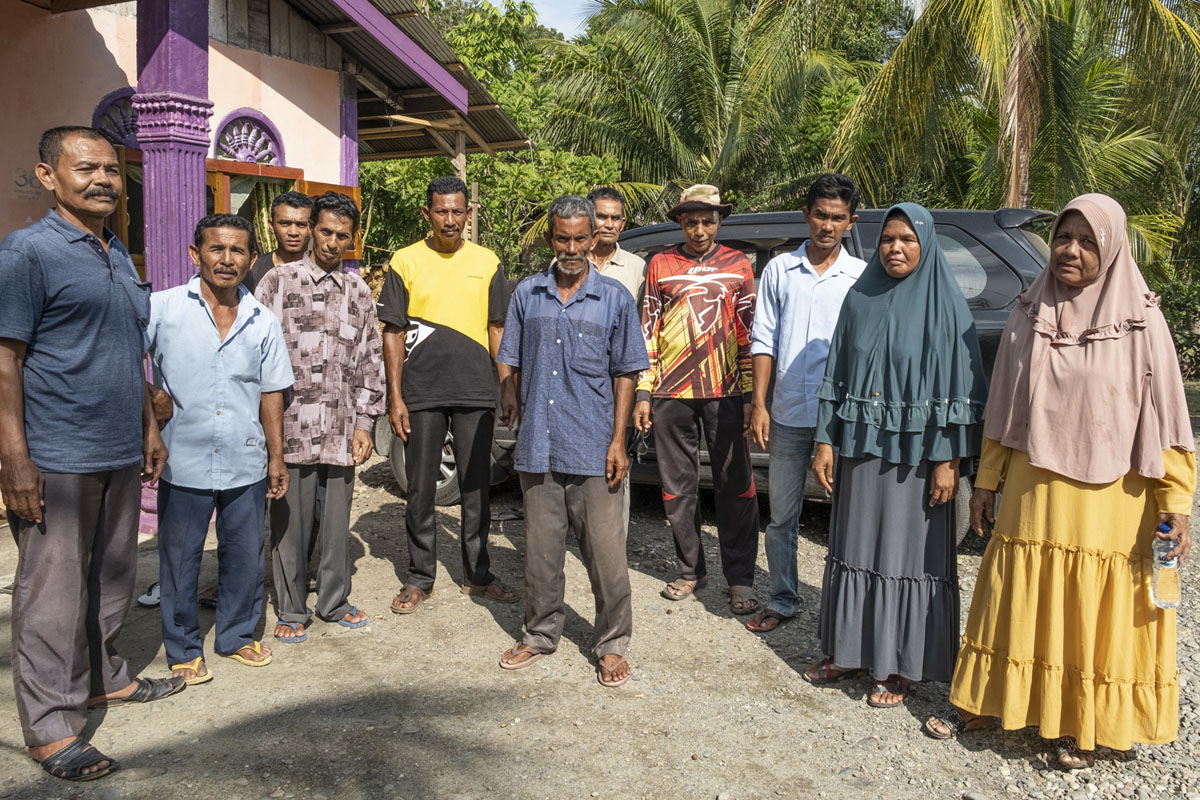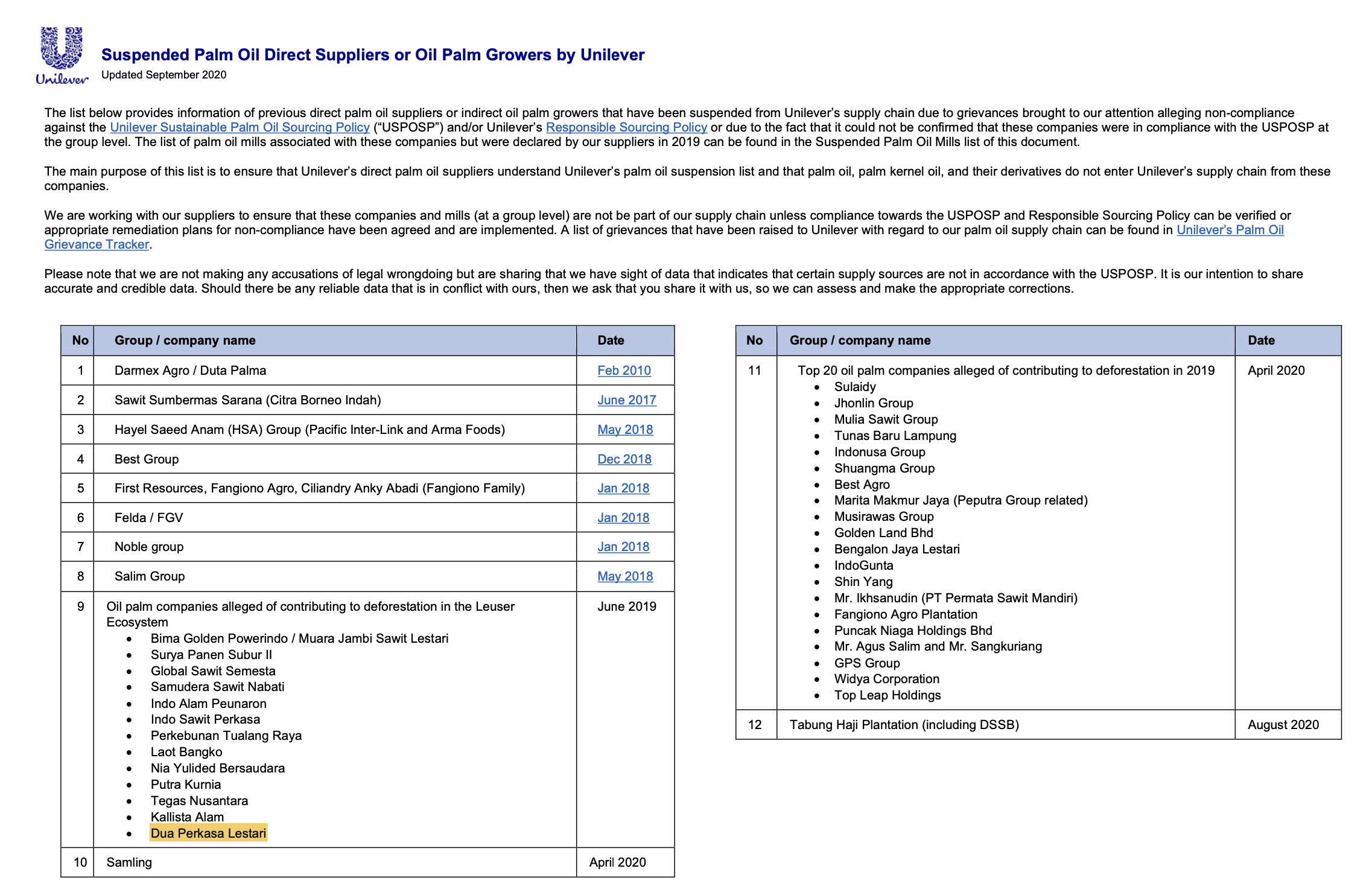Golden Agri Resources Needs To Engage PT. DPL to Ensure Remedy is Secured for Pante Cermin community
Facing public scrutiny after its complicity in human rights abuses was exposed, palm oil giant Golden Agri Resources (GAR) of the Sinar Mas Group has suspended controversial palm oil producer PT. Dua Perkasa Lestari. This suspension comes six years after the case was first raised as a concern by Rainforest Action Network, and is a basic first step in complying with its own stated policies against doing business with suppliers that continue to abuse and exploit communities. This action alone does not go far enough to remedy the harm caused to the Pante Cermin community impacted by the operations of the palm oil company over the past decade. There is now an urgent need for major brands sourcing from GAR, and banks providing it with loans and financial services, to ensure the palm oil giant engages directly with the suspended supplier to ensure remedy is secured for the Pante Cermin community.

In August 2020, RAN exposed Nestlé, Mars, Mondelēz, Unilever and Dutch bank ABN AMRO for their ongoing sourcing and financing of the Sinar Mas Group despite its violation of their own policies against human rights abuses. Clear evidence, documented by local organizations LBH Banda Aceh and Walhi Aceh, revealed a decade-long unresolved land conflict between PT. Dua Perkasa Lestari (PT. DPL) and the Pante Cermin community and supply chain evidence compiled by RAN’s field investigators proved that GAR continued to source from PT. DPL via a palm oil mill called PT. Beurata Subur Persada despite its gross violation of international human rights norms and its policies.
After it was exposed for the destruction of the Tripa peatland, the “orangutan capital of the world” in 2016, GAR has conducted its own investigation into PT. DPL. Despite undertaking a field visit to the plantation in November 2016, and years of ‘engagement,’ GAR either failed to identify the lack of proper permits by PT. DPL, the well documented land grabbing of customary lands, the destruction of community food crops and the use of military force to intimidate and displace community members in violation of the policies of Indonesia’s Ministry of Internal Affairs, or it chose to ignore these violations.
Since the recent publication of this ongoing human rights scandal, GAR issued an update on its grievance listing confirming PT. DPL’s violation of its Social and Environmental Policy (GSEP) and its decision to eliminate the supplier from its supply chain effective on 6 October 2020.

GAR confirmed it was sourcing from PT. DPL via PT. Beurata Subur Persada (PT. BSP) – the controversial mill found by RAN investigators to be sourcing palm oil from PT. DPL, but failed to state if it was sourcing from the rogue actor via other mills in the region. GAR claims to have eliminated PT. DPL after it failed to deliver a number of corrective actions, “namely the establishment of a constructive dialogue with the grievance raiser towards responsible conflict resolution above and beyond mere legal compliance.”
This case has exposed weaknesses in the human rights due diligence and grievance systems employed by Sinar Mas Group, as GAR’s parent company, to uphold the human rights commitments detailed in its published policy for its palm oil business. Since 2016, GAR has failed to engage directly with PT. DPL, or offer support to the company to ensure it takes the steps needed to establish a constructive dialogue and return land to the Pante Cermin community members.
GAR states that it will monitor the case through reviewing PT. Beurata Subur Persada traceability reports. The glaring problem with this is that PT. BSP’s traceability reports can not be trusted, as a report and mill lists published by GAR clearly show that the mill in question lacks traceability systems to know where 100% of the palm oil fruits it sources were grown (GAR’s last mill list states PT. BSP only has 84% traceability to the plantation). GAR remains at risk of sourcing from PT DPL via PT. Beurata Subur Persada and other mills that lack adequate traceability systems which continue to supply its refineries in Indonesia.
RAN continues to call on brands and banks, including Nestlé, Mars, Mondelēz, PepsiCo, Unilever, China’s ICBC, Mitsubishi UFJ Financial Group, Bank Negara Indonesia, CIMB Group, and ABN AMRO to suspend sourcing from, or financing of, the Sinar Mas Group and all its subsidiaries and associated companies until the corporate group can prove its compliance with No Deforestation, No Peatland and No Exploitation benchmarks, and remedy the social and environmental harm caused by its plantations and those of its suppliers. They must also ensure that GAR takes immediate action to directly engage with PT. DPL and ensure remedy is secured for the Pante Cermin community.
Nestlé, Mars, Mondelēz, and PepsiCo have all failed to publicly respond to this case––an example of the failure for all brands to prioritize efforts to ensure human rights are upheld in their palm oil supply chains and fulfil their responsibility to ensure Free, Prior and informed Consent has been given by all communities whose lands have been converted into palm oil plantations to supply cheap palm oil used in the manufacturing of their snack food and personal care products.

track record of deforestation
Unilever is the only brand that has published its list of suspended suppliers which includes PT Dua Perkasa Lestari, but fails to suspend the mill––PT. Beurata Subur Persada––caught sourcing from PT. DPL despite its instruction not to. Its grievance list refers to the social conflict caused by PT. Dua Perkasa but fails to outline actions taken by Unielver in response to the ongoing human rights violation.
As a matter of urgency Nestlé, Mars, Mondelēz, and PepsiCo and Unilever must issue public updates on interventions being taken to secure justice and remedy for the Pante Cermin community and decisions made to suspend sourcing from the Sinar Mas Group until it can prove policy compliance, and remedy the social and environmental harm caused by its plantations and those of its suppliers.












